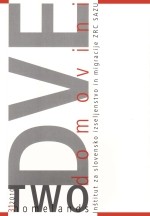Food and Memory in the Context of Migration
Keywords:
food and memory, migration contexts, intimate and personal identities, life narrativesAbstract
In this article, the topic of “thinking otherness through material culture” is presented through autobiographical narratives of Slovenian women migrants in the United States and their female descendants. The selected parts of the narratives speak about how food is tied to memory and remembering of the past. This connectedness is particularly interesting in the context of ethnic and intimate identities. One focus is therefore on the experiences of the construction of individual identities beyond the presupposed ethnic identity of migrants. The other deals with the exchange of goods, scents and memories in individually formed trans-national social fields. Particular attention is focused on the social, cultural and gendered contexts that are taken into the consideration as well as the personal experience of the researcher.
Downloads
References
Brettell, Caroline (2003). Anthropology and Migration, Essays on Transnationalism, Ethnicity, and Identity. Walnut Creek, Lanham, New York in Oxford: AltaMira Press.
Connerton, Paul (1992). How Societies Remember. Cambridge: University Press.
Coyle, Margaret (2004). Il Timpano – ‘To Eat Good Food is to be Close to God’: The Italian-American Reconciliation of Stanley Tucci and Campbell Scott’s Big Night. Reel Food: Essays on Food and Film (ur. Anne L. Bower). New York: Routledge, 41–60.
Fivush, Robyn (2008). Remembering and reminiscing: How Individual Lives are Constructed in Family Narratives. Memory Studies 1(1): 49–58.
Gobetz, Edward (1998). Our Heritage, the Art of Cooking and Multiculturalism. More Pots and Pans, A Cookbook of the Slovenian Women Union of America (ur. Corinne Leskovar). Joliet: SWUA.
Hall, Stuart in Paul du Gay (ur.) (1996). Questions of Cultural Identity. London, Thousand Oaks, New Delhi: SAGE, 1–17.
Hall, Stuart (1996). Who Needs ‘Identity’? Questions of Cultural Identity (ur. Stuart Hall in Paul du Gay). London, Thousand Oaks, New Delhi: SAGE.
Hochschild, Arlie R. (2003). The Commercialization of Intimate Life. Notes from Home and Work. Berkley, Los Angeles in London: University of California Press.
Holtzman, Jon D. (2006). Food and Memory. Annual Review of Anthropology 35: 361–378.
Kofler, Angelika (2002). Migration, Emotion, Identities, The Subjective Meaning of Difference. Dunaj: Braumüller.
Leskovar, Corinne (ur.) (1998). More Pots and Pans, Slovenian-American Cookbook, A Cookbook of the Slovenian Women Union of America. Joliet: SWUA.
Milharčič Hladnik, Mirjam (2005). Subjektivna realnost migracijskih procesov: Brati, poslušati in razumeti migrantske izkušnje. Dve domovini 22: 169–196.
Milharčič Hladnik, Mirjam (2006). Čezoceanske poti paketov v migrantski korespondenci 1940–1960: »… 2 žajfe, 6 žup v paketih, pa tiste bendiče za majhne rane …«, Dve domovini 23: 53–76.
Mlekuž, Jernej (2008). Čapac.si, or on burekalism and its bites. An analysis of selected images of immigrants and their descendants in Slovenian media and popular culture. Dve domovini 28: 23–38.
Povrzanović Frykman, Maja (2009). Material Aspects of Transnational Social Fields: An Introduction. Dve domovini 29: 105–114.
Sollors, Werner (ur.) (1989). The Invention of Ethnicity. Oxford in New York: Oxford University Press.
Rapport, Nigel in Andrew Dawson (ur). (1998). Migrants of Identity. Perceptions of Home in a World of Movement. Oxford: Berg.
Sutton, David E. (2001). Remembrance of Repasts, An Anthropology of Food and Memory. Oxford in New York: Berg.
Unetich, Florence F. (ur.) (1995). Treasured Slovenian and International Recipes. Cleveland: Progressive Slovene Women of America.
Žmegač, Jasna Č. (2007). Strangers Either Way: The Lives of Croatian Refugees in Their New Home. New York in Oxford: Berghahn Books.
Downloads
Published
How to Cite
Issue
Section
License

This work is licensed under a Creative Commons Attribution-NonCommercial-NoDerivatives 4.0 International License.
Authors guarantee that the work is their own original creation and does not infringe any statutory or common-law copyright or any proprietary right of any third party. In case of claims by third parties, authors commit their self to defend the interests of the publisher, and shall cover any potential costs.
More in: Submission chapter





